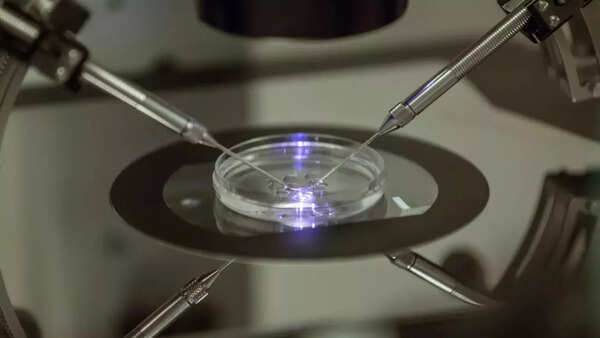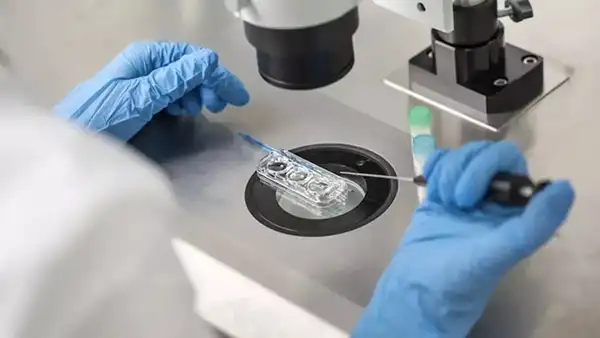A long wait of nearly two decades has come to an end.Doctors at Columbia University Fertility Center have reported what they are calling the first pregnancy using a new AI system, in a couple that had been trying to start a family for over 19 years.
What happened?
In a groundbreaking development in reproductive medicine, researchers at Columbia University Fertility Center have reported the first successful pregnancy using an innovative AI-based procedure known as STAR (Sperm Tracking and Recovery). This advancement offers new hope to couples facing male infertility, particularly those with azoospermia—a condition characterized by the absence of detectable sperm in the ejaculate.
What is Azoospermia?
Azoospermia is a condition where there is a complete absence of sperm in a man’s ejaculate. It’s a significant cause of male infertility, as sperm are essential for fertilizing an egg. While azoospermia can make natural conception difficult, it doesn’t necessarily mean a man cannot have children, as other reproductive technologies may be available.

There are different types of azoospermia, such as: Obstructive azoospermia: Caused by a blockage in the reproductive tract that prevents sperm from being ejaculated. This can be due to conditions like infections, surgeries, or congenital abnormalities.Non-obstructive azoospermia: Results from a problem with sperm production in the testicles, potentially due to genetic disorders, hormonal imbalances, or other health issues.Azoospermia can be caused by a variety of factors, including: Genetic conditions: Certain genetic disorders, such as Klinefelter syndrome, can affect sperm production. Hormonal imbalances: Low levels of hormones, like testosterone, can impact sperm production. Infections: Infections of the reproductive tract, like epididymitis or urethritis, can damage the testicles. Surgical procedures: Previous surgeries, especially those involving the reproductive system, can sometimes lead to blockages. Congenital abnormalities: Some individuals are born with abnormalities in their reproductive system that can affect sperm production or transport.
Overcoming azoospermia with AI technology:
Now, azoospermia accounts for approximately 10% of male infertility cases, and traditional methods often fall short in identifying viable sperm within semen samples.Columbia’s STAR system employs a combination of high-powered imaging technology and artificial intelligence to scan entire semen samples, capturing up to 8 million images per hour. The AI algorithm analyzes these images to detect and isolate rare sperm cells that might be missed by human embryologists.Once sperm are identified, a microfluidic chip directs them into separate channels, allowing for rapid and gentle isolation without the need for centrifugation or other potentially damaging procedures. This approach ensures that viable sperm are preserved and can be used for fertilization, offering a non-invasive and chemical-free alternative to previous methods.

From infertility to parenthood:
The significance of this breakthrough, which brings medical science and advanced technologies together, is amplified by the story of a couple who had been trying to conceive for nearly two decades. Despite undergoing 15 unsuccessful IVF cycles and repeated failures and heartbreak, their fortunes changed when they participated in a clinical trial utilizing the STAR system. The AI technology successfully identified viable sperm, leading to a successful pregnancy—a milestone that had eluded them for years.Dr. Zev Williams, director of the Columbia University Fertility Center and leader of the STAR project, expressed optimism about the potential of AI in addressing various infertility challenges. He noted that while the STAR system was developed to tackle azoospermia, similar AI-driven technologies could be adapted to enhance other aspects of fertility treatment, such as embryo selection and genetic screening.

Looking ahead:
The success of the STAR system represents a significant advancement in the field of reproductive medicine. By integrating AI into fertility treatments, clinicians can achieve higher precision and efficiency, potentially reducing the number of cycles required for conception and improving overall success rates.Moreover, the automation of sperm identification and isolation processes can alleviate the workload of fertility specialists, allowing them to focus on other critical aspects of patient care. As AI technologies continue to evolve, they hold the promise of making fertility treatments more accessible, effective, and personalized for individuals and couples worldwide.While the STAR system is still in the experimental phase, its success offers a glimpse into the future of fertility care—one where artificial intelligence plays a pivotal role in helping individuals achieve their dreams of parenthood.As research progresses, it is anticipated that AI will continue to revolutionize reproductive medicine, offering new solutions to longstanding challenges and bringing hope to many who have struggled with infertility.

